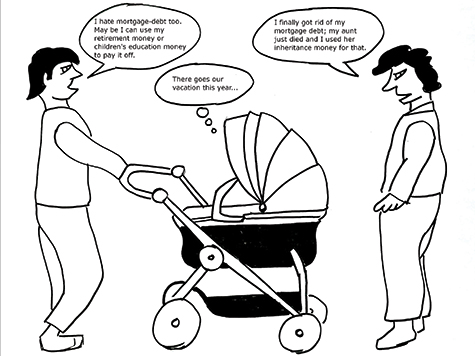
When we buy our first home, we probably don’t give much attention to the end date of the mortgage. Will I be still working at that time when the house will be fully paid off? Should I be making double payments to save on the interest charges? Should I be taking 15 year or 30-year mortgage? Those will be some of the more prominent questions popping in our heads.
When you are on your third or fourth home ownership, then different sets of questions start raising their curious head. You are reaching a point in your life where you are thinking of retiring, at least the question begins to linger in your head or comes about in discussions with your friends or may be with your spouse.
Not quite there yet, still a few years to go but many folks dream of getting rid of their mortgages as they retire. As it is, most of us, especially the Asian community, are so averse to having loans/debts that they cannot wait to be out of it and be free and clear of any monetary obligations.
Burn that mortgage
Thinking and dreaming of a “mortgage-burning” party as we approach retirement is a novel idea but paying off the mortgage is not necessarily the best strategy. Let me explain.
Paying off the mortgage, on many occasions, means taking a big chunk out of your savings account and paying off the loaning institution, assuming there are no penalties involved in doing so. Sometimes, it is better to keep that money in the bank for other purposes such as paying other higher interest debts or perhaps just keeping it as retirement money.
It becomes a compelling strategy especially when you have managed to acquire a low interest mortgage, as would be the case for those who borrowed for mortgage in the last 8 or 9 years.
Some of the folks who have seen more birthdays than others would remind you that back in their times most common mortgage rates would be in the neighborhood of 7 to 12 percent; compare that with the worst of today’s. It looks like easy money. In 1980’s the mortgage rates have gone as high as 15 percent (or higher) for a while and people were still borrowing at that rate. It is hard to fathom these interest rates in today’s environment.
In many cases, paying off a mortgage could make sense especially when you have ample retirement savings and plan to live in the same home for a while. The analysis depends on the terms of your mortgage, the amount of your savings and your expected retirement income and expenses. Clearly if you are not close to retirement, some projections are required for future stream of income and expenses to arrive at some conclusion of your strategy.
“It is absolutely imperative to run the numbers” says Catherine Collinson, President of Transamerica Center for Retirement Studies; “Every case is a little different.” And indeed, every family is different, has different priorities and different financial and social situation as well as different responsibilities.
The Boomer Generation
Baby boomers have been swelling the ranks of retirees now, have been for a while, and more homeowners have been carrying mortgage debt than in the past. According to the joint center for housing studies of Harvard University, more than 40 percent of homeowners aged 65 and older had mortgage loan on their primary residence in 2016. This change of attitude has happened for a few reasons; baby boomers as a generation have tended to be less risk-averse than the previous generation of depression-scarred parents.
Secondly, while the interest rates are rising, they are still low compared to historical standards as mentioned above. And considering the way Federal Reserve is thinking right now about their monetary policy the possibility of interest rates going up in a big hurry are low at least for a while.
So how should homeowners, approaching retirement, evaluate whether to pay off their mortgage. There are several considerations. First thing is to consider your income and expense stream in retirement. Now this stream is to be considered for your estimated lifespan and projected properly. This stream (cash flow) should also be considered with and without your current mortgage in it as an expense. This is a critical step.
If you manage to break even with the mortgage payment as part of the expense then the answer is very clear. If not then we will have to look at the interest rate, total debt and many other variables.
Home for Life
If you plan to live in your home for a foreseeable future or to age in place then paying off the mortgage can bring peace of mind. If you can afford to pay off the mortgage, and still have all the retirement assets you need, you might just feel better. That is especially true if the mortgage interest rate is much higher than the return you are getting on your investments. Tax implications for both the mortgage interest as well as the money earned on your alternate investments have to be considered.
However, if your retirement plans are not fully funded yet or you lack sufficient savings or emergency funds, keep the cash in the bank and leave the mortgage alone.
For soon to be retirees, it is best to plan ahead instead of assuming things and then getting surprises. It may affect your retirement schedule, or may give you enough time to find another job to continue income stream a bit longer. Refinancing the mortgage to a lower rate is also an alternative to be explored.
While it is not a bad idea to use low-earning savings to pay-off a higher interest mortgage, that only applies if you have more than you need for retirement and emergencies.
———
Mo Vidwans is an independent, board-certified financial planner. For details visit www.vidwansfinancial.com, call +1 (984) 888-0355 or write to [email protected].



